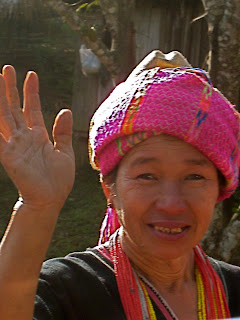The group just spent two weeks in Douthat State Park in western Virginia. We spent the time reflecting on the trip and processing our experiences to create individual presentations of learning. One group activity that we did early on to begin thinking about our travels was listening to NPR's This I Believe series and try writing our own. Here's mine...
I believe in the power of a smile to a stranger.
I have never been the type to strike up a conversation in an elevator or linger at the coffee shop, chatting to the barista about the weather. I’m not naturally at ease with people I don’t know. But spending six months traveling abroad has given me confidence in the ability of this casual gesture to forge inherently human connections.
As if I didn’t already stand out enough as a foreigner in rural villages in Ecuador, industrial cities in China, remote communities in Thailand, and townships in South Africa, I determined to go on daily runs. The habit inevitably drew curious stares; in most of these places, exercise for the sake of exercise is unfamiliar. Furthermore, many of these areas never saw visitors, no less white ones, and there I was, a real live blond in the flesh.
Initially, I ran as I always had, in my own world of pounding feet, pulsing muscles, and rousing music: alone, in my zone. Still, I noticed locals gawking at this strange and unusual sight. It was in no way unfriendly, but it made me uncomfortable to merely ignore it or pretend I didn’t notice. I quickly assumed the habit of smiling at those I passed, raising my hand in greeting. Some people found my wave even more baffling, but by and large, this acknowledgment completely changed the way I was perceived. I was a stranger, yes, a foreigner, and what I was doing seemed a little bizarre, but I was being friendly.
Some folks cheered my progress, others jogged alongside me for a dozen paces. In smaller communities, they came to recognize me and expect my regular passes. Even though these interactions were fleeting, they stand out to me as moments of genuine, cross-cultural engagement. There was nothing more gratifying than a smile returned, acceptance of my presence. For two strangers to hold each other’s attention for just a moment is to recognize someone else’s humanity. We may not know each other. We may be different. But we can connect through this universal gesture.
After six months abroad, acknowledging others in this way had become second nature, not just on runs, but as I walked anywhere. It wasn’t until I returned to the United States that I realized how precious it had been. I understood it during my first run back in New York City. In some ways, I was home. But in others, I was alone. Anonymous. I could no longer smile at strangers – not only would they think me peculiar, but they often didn’t even offer eye contact. I resolved to try, but the only responses I got were a whistle and a bewildered glower.
I despaired, a little, of the culture I had returned to. I missed the smiles and even the stares of locals in foreign places, because they, at least, had acknowledged seeing me. But I’ve persuaded myself our society is not completely devoid of casual friendliness between strangers: people offer up their subway seat, hold the elevator, prop open a door. Thank them. Linger over this brief interaction. People want to connect to each other. It’s human nature. So smile at a stranger. It feels good.



